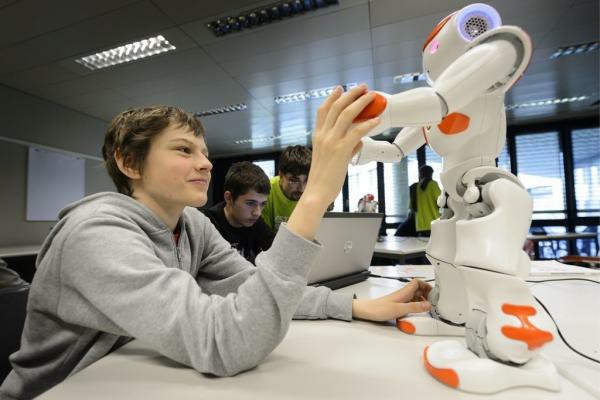Subscribe for our News

Switzerland gears up to place robots in classrooms
Sabine Seufert, Professor of management of educational innovations at the University of St Gallen, first used the humanoid robot on a trial basis in her lectures in 2019. Equipped with artificial intelligence, “Lexi” operates like a chatbot and can carry out simple auxiliary tasks such as a Google search. Today, the University is researching other ways in which the robot can be put to effective use in classes.
In school classrooms around Switzerland another robot is slowly making its entrance. “Thymio” is a small white box on wheels developed by Swiss Federal Institute of Technology in Lausanne (EPFL). Its main advantage is that it can teach computer programming in a simple way to school children.
Robots like “Lexi” and “Thymio” are at the forefront of the digital transformation under way in schoolrooms and universities in Switzerland today. The Covid-19 pandemic coupled with forced distance-learning decreed in many schools and universities, are accelerating this technological transition.
Switzerland has already gone a long way in developing learning with robots, according to Francesco Mondada, co-head of the educational robotics group at the National Centre of Competence in Research Robotics. One of the examples of Swiss-developed technology is the robot Thymio.
In the field of distance learning, the researcher sees greater potential for the use of intelligent chatbots, like those already found on the websites of banks and insurance companies. The chatbots could help ease workload of the teachers for practical and repetitive tasks and give guidance to students.
Seufert is convinced that using a chatbot as a tutor would be particularly helpful in the teaching of languages for instance, where a lot of repetition is needed. “A robot has the potential to disrupt the educational form of the classical class and to raise a lot of interest. It can bring a new dynamic into the class,” Mondada added.
Price remains a definite setback; not all schools can afford a classroom robot. Lack of training for teachers, inadequate equipment and poor technology are also holding back a general rollout. The Digitalswitzerland initiative, which promotes Switzerland as a hub for digital innovation, recognizes that there is “undoubtedly still untapped potential, although schools have already made great strides in introducing educational robots”.
There is one area of a very successful application, though, where Switzerland is a front-runner. For years, small robots called “Nao” have sat in for sick children at school, enabling them to keep interacting with the class, whilst at home or in hospital.
One of the biggest challenges, in Mondada’s view, is making sure that the children do not just play around with the robot but also learn. He argues the teachers first have to grasp the basic technologies behind these new tools to use them efficiently.
TechLabs offers after-school and weekend classes in the Swiss cities of Basel, Geneva, Zurich and Zug. The Robot Hand programme equips students between the ages of six and 10 with a complex toolkit covering 3D Design, 3D Printing, mechanical engineering, as well as circuits and sensors.
The programme is certified by Enabling the Future, an international online community of 8,000 people which is using 3D printing technology to create printed hands and arms for those in need of such devices.
They are not on par with a medical prosthetic in terms of quality, but the process itself offers a valuable lesson in empathy, says the programme founder.
“The power of this is that the tech is now accessible, and we can use it in a way that can impact other people’s lives,” says Joel Radvanyi, a former high frequency trader who founded TechLabs in January 2016. “This is a super low-cost solution that first and foremost gives you a way to overcome a lot of the emotional challenges of being different as a kid. They go from being shunned to being the robotics kid in the class.”
Such project-based learning draws on a child’s natural curiosity and creativity while passing on technical skills, say the instructors. The course is fee-based and has attracted an almost equal number of expat and local students. Corporate sponsorships allow for children of low-income families to participate.
Links:
https://www.swissinfo.ch/eng/switzerland-gears-up-to-place-robots-in-classrooms--/46402716
https://www.swissinfo.ch/eng/project-based-learning_robotic-hand-teaches-kids-the-power-of-tech-and-empathy/44799648
https://techlabs.ch/
http://enablingthefuture.org/

